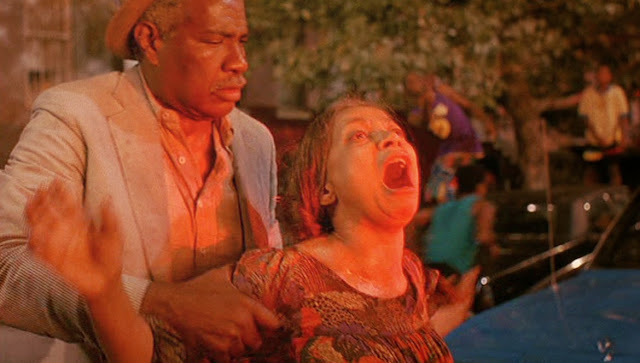"We as filmgoers are so accustomed to movies where there's a definitive beginning, definitive middle and decisive end. I think that Do the Right Thing
threw a lot of people off and was perhaps part of what made it a sensational movie in 1989--sensational in the sense that perhaps more so than any other movie during that year, it attracted considerable media attention. It attracted considerable attention within the academic community. There was a very interesting and profound buzz about the movie, and I think part of that was because the movie ended on a series of question marks as opposed to definitive conclusions and definitive statements. It left people wondering, 'What was the right thing?' Was Mookie right or justified when he threw the trash can through Sal's pizzeria window and then started the incident that ensued from that point on? What are the right racial politics and black political ideology? Is it Malcolm's version or is it Martin Luther King Jr.'s version? What are the best and most effective ways for blacks to deal with perceived racial injustices and real racial injustices?"--S. Craig Watkins, author of Representing: Hip Hop Culture and the Production of Black Cinema,
discussing Do the Right Thing
during an early incarnation of AFOS
on KZSC-FM back in 1999
When I first saw as a teen
Spike Lee's
Do the Right Thing, which turns
25 years old today, it was in the form of a heavily censored but still-provocative-for-network-TV version on CBS. Lee, who
approved the CBS cut, had all the "motherfuckers" replaced with "mickey-fickey," a euphemism that never really caught on like, say for example, "shut the front door" has.
Do the Right Thing's still-amazing (and
still-misunderstood) "Fight the Power" theme, which was performed by the groundbreaking mickey-fickeys who make up Public Enemy, along with P.E.'s earlier track, the
Yo! MTV Raps staple
"Night of the Living Baseheads," helped get me hooked on hip-hop and made me interested in seeing the much-hyped movie that introduced "Fight the Power," even if it was in butchered form on CBS. ("Fight the Power," by the way,
can be heard on AFOS, along with several of composer Bill Lee's score cues from the 1989 film.)
I didn't actually become a fan of
Do the Right Thing until the second time I saw it, and this time, it was in its entirety and in the form of a copy one of my older brother's university housemates had of MCA/Universal Home Video's VHS release, which wasn't full of all those dubbed-in and distracting "mickey-fickeys" that meshed poorly with the frankness and rhythm of Lee's original dialogue. The then-controversial 1989 film floored me. I had never seen anything like it before.
Lee's open-ended and complex screenplay about both Bed-Stuy racial tensions, which mirrored real-life racially motivated violence in Bensonhurst and Howard Beach, and the moral dilemma over how to handle that kind of animosity, introduced me to a more cerebral and mature kind of cinema, where there are no clear-cut heroes and villains, and like life, not everything has a tidy ending. It's the same kind of cinema that, unfortunately, has become less common on the big screen--thanks to the post-
1989 Batman flurry of tentpole franchises and
superhero movies marketed to teens and adults who still act like teens--and more common on cable TV these days, whether it's in the form of
original movies or
original series.
Do the Right Thing helped improve my tastes in film, which tended to lean towards blockbusters like Tim Burton's
Batman and
Indiana Jones and the Last Crusade before I got into Lee's work. The 1989 Lee Joint was my gateway to Lee's other joints, then to
GoodFellas and other Martin Scorsese Pictures, and then to
Chan Is Missing,
Dog Day Afternoon and so on. Movies didn't have to dazzle me with just explosions and tits anymore. I learned to become dazzled by adult ideas and themes and--in the cases of
Do the Right Thing and
GoodFellas, another superb late '80s/early '90s New York movie that was robbed at the Oscars--brilliant dialogue and clever editing.
I was introduced to
Do the Right Thing at a time when I became aware of the racism around me and started getting into hip-hop because in their verses, rappers were anti-establishment, and they spoke to me about topics I was dealing with at the time--and in some ways, still do. As a teen of color, I identified with the anger and frustrations expressed in
Do the Right Thing by both Lee's younger black characters (yep, that's a young Martin Lawrence speaking in a Daffy Duck lisp in the John Savage/gentrification scene) and the members of P.E., who showed how much they adore an old icon of white America like Elvis Presley by snarling, "Motherfuck him and John Wayne!" I dug how Lee
helped change African American cinema (as well as indie cinema) and empowered non-white viewers--and would-be filmmakers of any color--with his bold, angry, funny and complex cinematic statement, and it made me want to someday create something for my community, the Filipino American community, that would be equally bold, angry, funny and complex.
 |
| (Photo source: Miss Info) |
Twenty-five years after its release,
Do the Right Thing remains a vital and relevant work (much more so than
Batman, summer 1989's most popular film, as well as the film that was my favorite for three years, until I came across
a far better TV version of
the Bill Finger creation that outshined Burton's version). That vitality is mostly due to Lee's skills with the material. But it's also because prejudice, gentrification, police brutality and racially motivated violence--all issues that Lee covered in
Do the Right Thing, but not in an inane, Paul Haggis'
Crash kind of way--continue to affect people of color. Yesterday's Bensonhurst and Howard Beach are today's George Zimmerman and
Elliot Rodger.






No comments:
Post a Comment